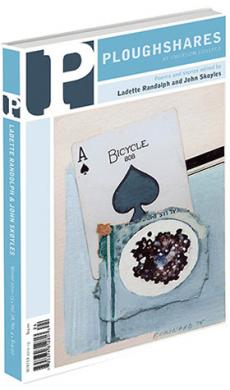Introduction
Given all of the anxiety about the future of literature in an electronic age, one thing that seems unlikely—despite the fears otherwise—is that as a culture we will stop reading. Rather, we seem to be reading (and writing) more than ever. By some counts, there were over four hundred thousand books published in this country last year, with as many as half of those self-published. In addition, there were countless stories, articles, essays, and poems published on the web.
One result of the rich supply of writing available in print and on the web is that contemporary readers are a bit dazed. Some now say they want more than anything someone they trust to direct their choices, to select from the overwhelming plenty and make recommendations. In other words, many readers are asking for someone to play the role of editor.
At Ploughshares, we’re always struck by the number of talented writers who send us their work each year and trust us to read it with care. Our task as editors is not so much to find the “good stuff” as to make difficult choices between equally strong work. Our dedicated readers and subscribers have let us know they appreciate our making these decisions.
Although Ploughshares is committed to moving forward and taking advantage of the opportunities afforded us by twenty-first-century technologies—like digitally publishing our backlist and current issues for e-readers, and introducing Ploughshares Solos, a new e-book series for longer pieces—we’re convinced reading carefully hasn’t gone out of style.
Reading, like writing, is slow work, and we’re committed to keeping it that way. It takes many dedicated screeners countless hours of reading to bring together each issue of Ploughshares. It’s worth the time it takes. The work we publish is the work we believe will last, and will reward not only reading but also rereading. Thoughtful engagement with the world through literature is not a quick endeavor.
In fact, we believe in what might be called—if it were a movement—the Slow Reading Movement. (Or, as Maura Kelly referred to it in The Atlantic, the Slow Books Movement.) And as I think about it, why not start such a movement?
In a fast-paced world with more choices than we can possibly entertain, quiet contemplation has become among the scarcest of resources. Whether you do it on paper or on a screen, consider the reading of this issue of Ploughshares an opportunity to partake in something truly rare and valuable—your undivided time, your connection with the world not through social media, but through your own mind and imagination.
The poems selected by my coeditor, John Skoyles, and the stories and essays selected by me, range from writers whose work is appearing in a national journal for the first time, to those who have published multiple books, including a Pulitzer Prize winner. Amazingly, John Skoyles first heard Afaa Weaver read “Visit #1” in 1996. He admired the poem so much at the time he asked for a copy, which he kept all these years. For our coedited issue, John contacted Afaa on the slight chance the piece had not appeared anywhere, and it is our good fortune to have it here in print for the first time. A piece of writing that, encountered once, stays with you for years—in a world of increasingly temporary media—is the kind of work we aspire to publish.
As much as things may change in the technology of the book as we know it, there is strong evidence of an ongoing, even consuming interest in literature. This continued desire to see our lives reflected in poems, stories, and essays, is a hopeful sign. We’re dedicated here at Ploughshares to bringing you, our reader, work we’ve read with care and now, with excitement, share with you.


